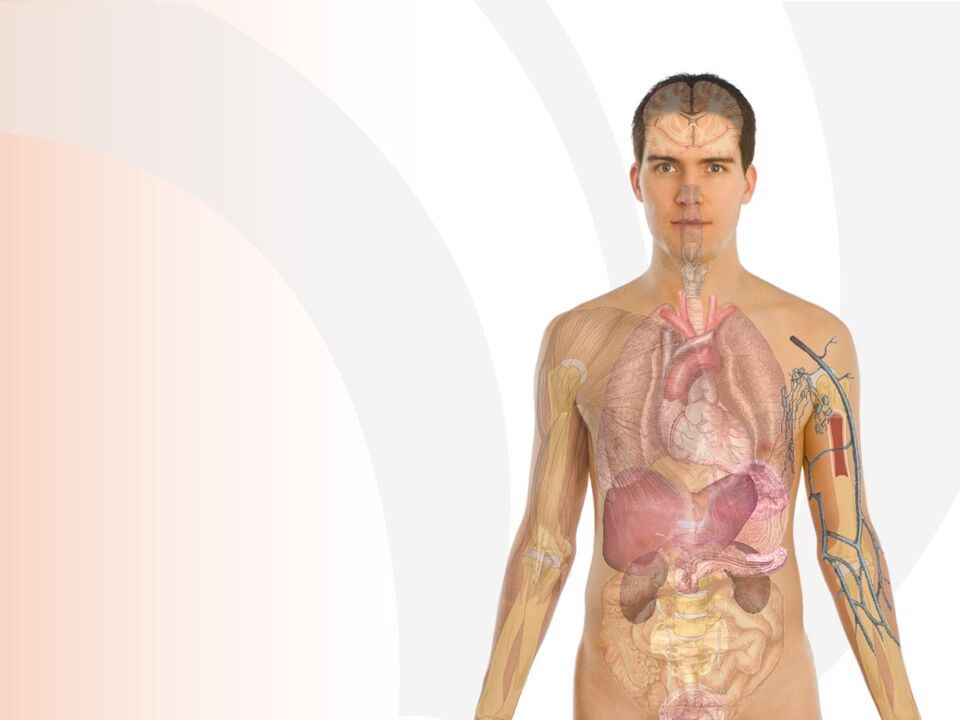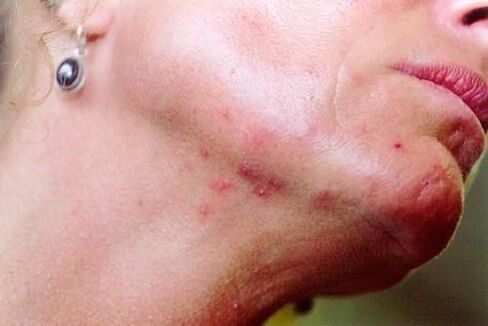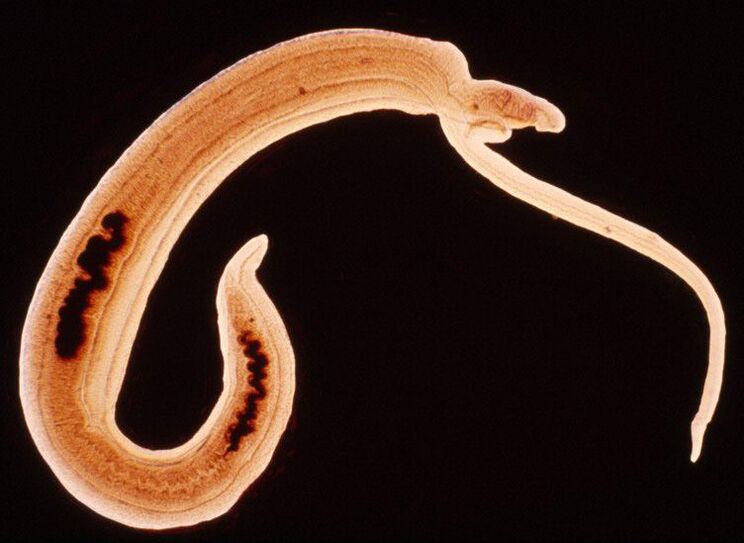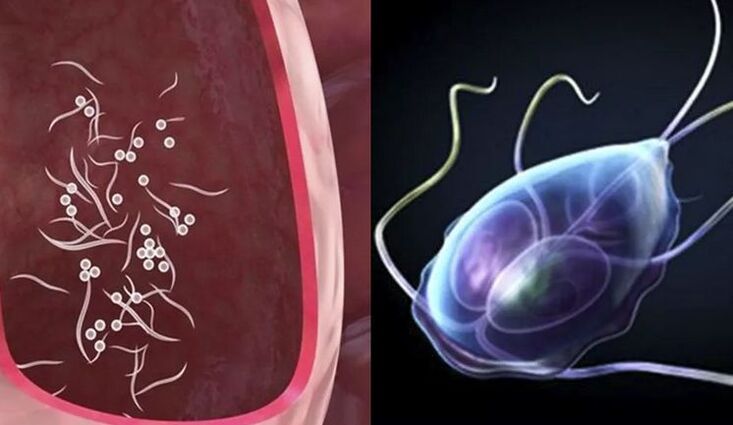Symptoms of infection with worms are different. For example, dyspeptic disorders most often develop - nausea, vomiting, pain and bloating in the abdomen. Some patients do not pay attention to the signs until they develop rashes that cannot be eliminated by conventional drugs. Often, helminthic invasion is accompanied by symptoms similar to other diseases and allergies. Therefore, timely diagnosis is required.

Infection with worms in humans
Most helminths spread into the human body by eating unwashed fruits and vegetables. After spreading throughout the body, damage to organs occurs, which causes serious diseases. Pathologies of the liver, kidneys, heart, digestive tract, gallbladder, even oncology can develop.
A frequent characteristic symptom is skin irritation, a rash. But a person may not pay attention to this for years, while the pathology develops, although it is enough to take anthelmintic drugs in a course to fully recover.
Methods of infection
There are 4 methods by which worms spread into the human body:
- Geohelminthiasis. The parasite enters through the soil that remains on unwashed fruits and vegetables and spreads into the water. Also, infection is possible with poor hand washing after working with the ground. Contact with the ground is often observed about animals that come into the house with dirty paws. Eggs, larvae, adults can enter the human body.
- Contact. In the body of the host, the female lays 4-5 thousand eggs in 1 day. They can spread from an infected person to other people after contact, especially in the home. Eggs or adults are spread through bedding, towels, personal hygiene items. It is enough for an infected person not to wash their hands. Most often, this path is characteristic of pinworms, worms.
- Biohelminthiases. Parasites are stored in the body of living and dead animals, fish. Subsequently, a person can eat them. The preservation of parasites is noted with insufficient heat treatment.
- Insect bites. In this way, helminth eggs with the smallest sizes are transmitted.
Of all forms of helminths, infection most often occurs by ingestion of eggs and larvae. They can be found in soil, water, on an infected person, in raw meat. It is important not only to wash food and hands, but also to always use heat treatment for food.

Symptoms of helminthiasis
Symptoms of infestation differ depending on the stage of the disease.Most often, the following symptoms appear:
- weight loss, emaciation;
- pallor of the skin;
- itching in the anus.
The symptoms are similar to other pathologies, so the patient may use the wrong methods of therapy. Symptoms may vary depending on the area of the body affected. For example, with liver damage, yellowing of the skin occurs.
Gastrointestinal dysfunction
With the penetration of pathogens into the digestive tract, the following symptoms develop:
- violation of the formation of fecal masses (constipation, diarrhea);
- itching in the anus;
- dyspeptic disorders - nausea, vomiting, abdominal pain, heartburn;
- colic in the intestines;
- flatulence, accompanied by swelling;
- periodic change in body weight from a greater to a lesser degree.
In the early stages, the symptoms are almost invisible. The more the worms damage the internal organs, the more actively the symptoms develop. Some parasites are able to secrete waste products that are foreign to the body. This leads to severe intoxication and diarrhea. Large worms spread throughout the intestines, preventing the passage of feces. This causes constipation.
Due to the release of waste products of worms, a person is subjected to severe intoxication. That is why weakness, malaise, dyspeptic disorders develop.
Immune suppression
When a person consumes food, nutrients enter the body and are distributed throughout the tissues.Helminths eat them, so the patient develops the following deviations:
- hypovitaminosis;
- metabolic disease;
- suppression of the immune system.
A person often begins to get sick with viral, acting, fungal diseases. Even with the use of multivitamin preparations, hypovitaminosis will not be eliminated until anthelmintic treatment is completed.
Neurological disorders
Some types of helminths are capable of damaging the peripheral tissues of the nervous system, crossing the blood-brain barrier. These properties are possessed by the products of their intoxication.Damage to the nervous system causes the following symptoms:
- constant forgetfulness, poor memory;
- headache up to migraine;
- dizziness;
- stress, neurosis, depression;
- increased fatigue.
The patient's behavior changes. He comes into conflict with people around him, forgets his acquaintances. Gradually, the symptoms are supplemented, the body temperature rises more than 39 degrees.

Chronic hypovitaminosis leads to chronic fatigue syndrome. Gradually, the level of red blood cells decreases, causing anemia. The person becomes irritable and aggressive.
Respiratory disorders
Even in the initial stages, damage to the deepest parts of the respiratory tract can develop.The following pathologies develop:
- tracheitis, bronchitis;
- emphysema, bronchial asthma, pneumonia.
A sign of helminthic invasion can even be frequent rhinitis and pharyngitis.
Skin problems
In order for the epidermis to develop normally, a sufficient amount of vitamins, trace elements, and minerals is required. Worm infestation leads to hypovitaminosis, so the quality of the skin suffers.The following deviations appear:
- acne, acne, rash;
- itching, peeling, redness of the epidermis;
- exfoliation of the nail plate.
Even the most severe skin pathologies can develop:
- urticaria, dermatitis;
- papilloma, seborrhea;
- allergic reaction.
The doctor and the patient may not immediately understand why drugs do not help with these pathologies. The quality of the skin deteriorates significantly, it becomes pale, wrinkles appear. Turgor decreases, that is, surface tension.

Signs of infection depending on the type of helminths
The severity of symptoms depends on the following factors:
- the number of parasites in the body;
- degree of immunity activity;
- localization of parasites;
- kind of parasite.
Some helminths can stay in the host for a long time without causing negative symptoms. Other individuals are capable of instantly deteriorating health, damaging the liver. For example, roundworm.
Roundworm
Ascaris damages many internal organs, causes certain symptoms, similar to other diseases.The following symptoms may appear:
- hyperthermia;
- prolonged cough;
- severe fatigue;
- bronchitis, pneumonia.
First, the digestive tract is damaged, therefore, hypovitaminosis and metabolic disorders are formed. The human body is depleted.Gradually, signs of damage to the gastrointestinal tract are formed:
- yellowness of the skin;
- intestinal obstruction.
With the spread of worms through the blood-brain barrier, a severe headache, migraines, and a depressive state appear.
Schistosomiasis, trichuriasis, ankylostomiasis, diphyllobothriasis
Parasites cause the following deviations:
- lack of nutrients and vitamins;
- reduced metabolism, causing a change in body weight;
- intestinal dysbiosis.
Gradually, hypovitaminosis turns into beriberi, which leads to significant depletion of the body. A person's skin turns pale, he can often faint, which is typical for anemia.
Pinworms
Pinworms are characterized by the deposition of eggs in the anus, usually this process occurs at night. Therefore, a person is worried about severe itching in the anus. The disease is characterized by periodic remission, so sometimes the itching stops. If there is no treatment, the helminthic invasion becomes extensive, so itching worries the patient at any time of the day.
Trichinosis
The parasite penetrates into any part of the body, produces a large amount of toxins. This leads to constant spasm, cramps, muscle pain. Due to damage to the cardiovascular system, edema is formed. With severe intoxication, the body temperature rises.
Fascioliasis, opisthorchiasis, clonorchiasis
This is one of the most dangerous helminths, leading to the following lesions:
- difficulty in the liver with the development of jaundice;
- intestinal obstruction, dyspeptic disorders when spreading along the gastrointestinal tract.
Gradually, the patient develops hepatosplenomegaly.
Urogenital schistosomiasis

Parasites actively spread through the genitourinary system. Due to the chronic inflammatory process, damage to the mucous membranes occurs. Therefore, when urinating, a person detects red urine, indicating the development of foci of bleeding.
Habitats of worms
In the human body, helminths can damage different types of organs:
- vlasoglav - large intestine;
- ascaris, tapeworm, hookworms - small intestine;
- roundworm - liver.
Depending on the damaged organs, different symptoms are formed:
- liver - jaundice, pain in the right hypochondrium, hepatitis;
- respiratory tract - trachea, bronchitis, pneumonia;
- brain - convulsions, paresthesia, fainting.
Simultaneous treatment of the disease (hepatitis, colitis), elimination of helminths is required.

Common helminths
Scientists count a huge number of parasites found in the human body. There are more than 100 of them in total.But more often, doctors distinguish infection with the following parasites:
- pinworm;
- dwarf tapeworm;
- tapeworm;
- hookworms;
- whipworm;
- paragonimiasis;
- cysticercosis.
To determine the exact type of pathogen and prescribe the right treatment, it is required to conduct laboratory and instrumental diagnostics. First, the patient is examined by a therapist, then he gives feces for a coprogram, the detection of worm eggs. Usually, therapists and infectious disease specialists recommend undergoing a study twice, since even in the presence of infection, eggs and larvae may not be detected.
A laboratory blood test is recommended for patients at risk:
- the presence of pets;
- work related to animals;
- medical workers;
- employees of children's educational institutions;
- food workers.
Attention! In order to accurately identify the helminth and its products of intoxication, it is recommended to conduct an enzyme-linked immunosorbent assay. It is performed in municipal clinics and hospitals, as well as private laboratories.
Therapy Methods
It is forbidden to independently select drugs against helminths, since they strongly affect the state of the liver and kidneys. It is recommended to undergo an initial examination, after which specific drugs are prescribed. The dosage is selected depending on the state of health, age, body weight of a person.
The following methods of drug administration are selected:
- tablets - mild or moderate degree of helminthiasis;
- injections, infusions - a severe degree of the disease, the formation of an excessively large number of parasites, severe damage to the digestive tract.
Many drugs can only act on adults. If there is a risk of eggs and larvae, it is better to undergo a second course of therapy or choose a more potent remedy.
The table shows the optimal drugs for treatment.
| Substance | Influence |
| Mebendazole | Completely kills pinworms, hookworms, whipworms, tapeworms and other parasites |
| Pyrantela pamoate | The substance destroys roundworm, effective in enterobiasis and necatorosis |
| Levamisole hydrochloride | Destroys roundworm and hookworm |
| Pirvinia embonate | Helps to cure enterobiasis completely |
| Albendazole | It helps to destroy most of the elements at the adult or larval stage. |
Initially, it is recommended to identify the exact pathogen, only then apply the medicine. This will increase the chances of recovery without a negative effect on the body.
Prevention methods
To prevent the introduction of parasites into the body, use the rules of prevention:
- washing hands after coming home, throughout the day, after contact with animals;
- the use of personal hygiene items, dishes only by one person;
- taking multivitamins, giving up bad habits to strengthen the immune system;
- thorough washing of fruits and vegetables, heat treatment of meat and fish;
- the use of high-quality drinking water from proven sources.

Helminths can be contained in many products, so it is impossible to exclude the risk of their spread into the body. Anyone can be infected with the parasite without even knowing it. It can spread from one family member to others through household contact. Therefore, it is necessary to use preventive measures on a daily basis.
It is important to take good care of the animals. It is required to wash them periodically, to give drugs from parasites to reduce the risk of helminth infection.
If a person suspects that he was charged with helminths, it is better to take a laboratory test in a timely manner. It is repeated twice to avoid a false negative test. Self-administration of drugs is prohibited. All of them are potent, negatively affect the liver. Only a doctor will be able to choose the optimal anthelmintic agent with the right dosage. If timely treatment is carried out, it is possible to prevent the development of serious diseases, immunodeficiency.























